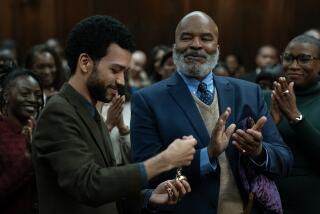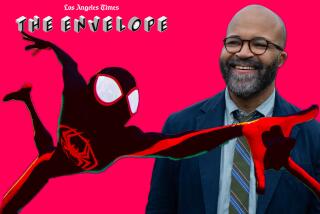FILM REVIEW : Director Frequently Loses Her Way in ‘Mississippi’ Journey
LAGUNA BEACH — Director Mira Nair tries to reach across international borders with “Mississippi Masala,” her multicultural/multiracial movie about a romance between a good Indian girl and a good African-American man in the unforgiving American South.
Born in India, Nair introduced herself loudly in 1988 with “Salaam Bombay!,” an almost flawless depiction of a country boy’s desperate life in Bombay. What made the film so striking was her confidence, the near-documentary truthfulness that came from her ease in navigating her native society.
But in her journey to the backwater of Greenwood, Miss., Nair frequently misplaces the compass. “Mississippi Masala,” being shown tonight as part of the Laguna Beach Festival of Arts’ “Windows Onto an American Landscape” series, is a meandering hybrid of art house thoughtfulness and Hollywood mainstreaming.
You don’t have to look further than Denzel Washington’s pleasing face to see that Nair is trying to expand her audience. As Demetrius, a hard-working local guy who falls for a pretty Indian immigrant, Washington is the picture’s obvious star power, its charisma factor, as attractive as he is likable. Never mind that he often seems to be sleepwalking, unsure of Nair’s intentions (unusual love story, interracial drama, multicultural examination? The audience can’t be sure, either).
The film’s title comes from an Indian word for hot, mixed spices, and it’s symbolic of several things, especially the relationship between Demetrius and Mina (Sarita Choudhury, in her first film role), who settled in Mississippi with her parents when she was small.
They meet haphazardly, when she rear-ends the van he uses in his carpet-cleaning business. They like each other right off and a bit later, after a mildly sexy scene in a roadside bar, they begin a halting courtship that is tested by the prejudices of family and friends.
The romance is “Mississippi Masala’s” anchor and conscience, but it’s the movie’s least compelling ingredient. There just isn’t any connection between Washington and Choudhury; they both look good but beyond that we don’t know why they would like each other so much, especially to take the risks they do.
Neither seems very interested in the other’s background--the appeal of the exotic, whether as simple curiosity or forbidden pleasure, doesn’t impact them. Without taking advantage of their differences, the scenes play out in vague and unsettled ways.
Washington and Choudhury don’t measure up well, either. He’s an appealing actor, even when caught in a muddle, but her inexperience dominates. She’s voluptuous, but that means little when she can’t convince us of anything, not even the simplest emotions.
The love affair clashes with the film’s more intriguing tale, of how Mina came to Mississippi in the first place and how it became home for a displaced but apparently thriving community of Indian refugees.
We learn early on, in the movie’s most vivid passages, how Mina’s father (Roshan Seth) and mother (Sharmila Tagore) fled Uganda in 1972 just before Idi Amin expelled its Asian population.
Nair often comes back to the father’s longing for the life he left behind, contrasting his reveries with the world that the Indian expatriates have created in Greenwood. Cinematographer Ed Lachman makes the dissimilarities epic; Uganda is all lush, expansive beauty while the town is down-home and dusty.
“Mississippi Masala” finds its way in these stretches. In gently absorbing ways, Nair shows the contradictions faced by Mina’s family and friends in a culture that demands assimilation but makes it so hard. That’s the better story, the story Nair should have stayed with.
* Mira Nair’s “Mississippi Masala” (1992) will be shown tonight at 6 and 9 at the Festival Forum Theatre on the Festival of the Arts grounds, 650 Laguna Canyon Road, Laguna Beach, as part of the “Windows Onto an American Landscape” film series. $4 to $5. (714) 494-1145.
More to Read
Only good movies
Get the Indie Focus newsletter, Mark Olsen's weekly guide to the world of cinema.
You may occasionally receive promotional content from the Los Angeles Times.










